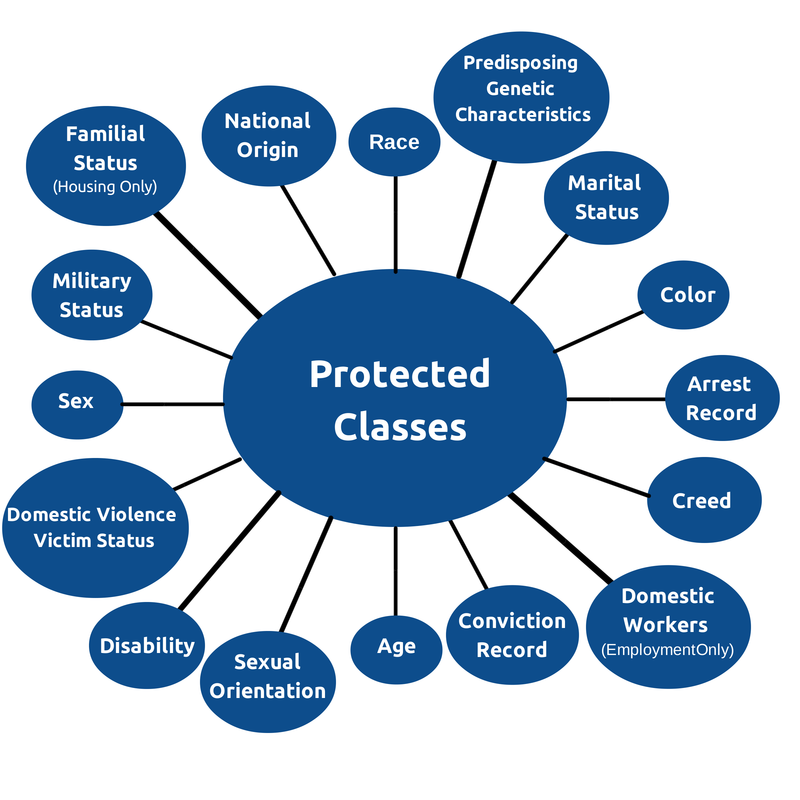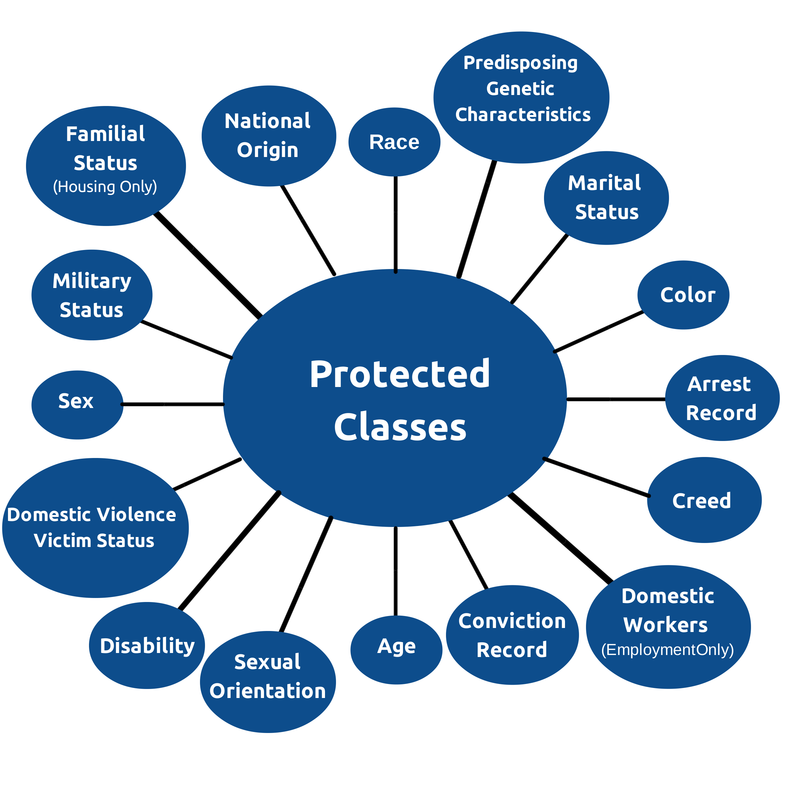Things you should not have your clients put in a letter to a buyer or seller.
Protected Class
-
Race.
-
Color.
-
Religion or creed.
-
National origin or ancestry.
-
Sex.
-
Age.
-
Physical or mental disability.
-
Veteran status.
-
Genetic information.
-
Citizenship.More…
Discrimination is treating people differently. Discrimination is unlawful when it is based on a personal trait or characteristic protected under Human Rights Law. The traits that are protected under Human Rights Law are called Protected Classes. It is unlawful to discriminate against a member of a protected class when it comes to housing, employment, public accommodation, credit and lending, certain educational institutions, and volunteer firefighting organizations.
Rights
All citizens should be aware of their rights under Human Rights Law, including their right to file complaints against alleged acts of discrimination. In order for an alleged discriminatory act to be illegal, there must be a connection between what happened to you and the trait/characteristic protected by the Human Rights Law. Making a Human Rights complaint is free for the person making the complaint.Responsibilities
If you are an employer, housing professional, lending institution, or business, it is important to understand your responsibilities under the Human Rights Law. Awareness of the laws can help you create equitable environments in our community, as well as prevent costly and time-consuming legal proceedings.
Descriptions of Protected Classes
Age
The Human Rights Law protects person(s) age 18 or older. A person cannot be discriminated against on the basis of his or her age in the area of employment or housing. Age discrimination usually occurs in employment when older workers are fired, replaced by younger workers, or treated differently than younger colleagues. Employees cannot be forced to retire except for very limited situations relative to tenured professors and certain highly paid executives.
Creed
Relates to a person’s religious beliefs. The wearing of religious garb and the observance of religious holidays and practices are protected under the Human Rights Law.
Race & Color
Race and color pertains to a person’s racial background and/or skin color.
Sex
Discrimination on the basis of sex includes unequal treatment in the workplace, sexual harassment, and pregnancy discrimination. Under the Human Rights Law, men and women are entitled to equal pay, benefits, working conditions, and seniority rights; men and women are entitled to be free from unwelcome sexual advances, requests for sexual favors, physical or verbal conduct of a sexual nature, and a hostile work environment; and pregnant women are guaranteed the right to work, and to enjoy the same medical, vacation and disability leave policies as non-pregnant co-workers. Although sex discrimination occurs most frequently in the workplace, it also occurs in areas concerning housing, credit, and public accommodations.
Sexual Orientation
The Sexual Orientation Non-Discrimination Act of January 16, 2003, amends the New York State Human Rights Law to prohibit actual or perceived sexual orientation discrimination in places of public accommodation, non-sectarian educational institutions, credit transactions, housing, commercial property, and in obtaining employment. Sexual Orientation is defined as gay, lesbian, bisexual, heterosexual, and asexual.
National Origin
Is based on one’s national group and includes one’s ancestry.
Marital Status
A person may not be discriminated against on the basis of whether or not he or she is married, divorced, single, separated or widowed.
Domestic Violence Victim Status
The New York State Human Rights Law was amended effective July 7, 2009 to provide protection from employment discrimination for victims of domestic violence. The Human Rights Law defines a domestic violence victim as an individual who is a victim of an act, which would constitute a family offense under N.Y. Family Court Act § 812. It is unlawful to discriminate against a domestic violence victim in employment and housing.
Disability
A disability is a physical, mental, or medical impairment resulting from anatomical, physiological, or neurological conditions that prevent the exercise of a normal bodily function or is demonstrable by clinical or laboratory diagnostics techniques. If a person has a record of a disability or is perceived by others to have a disability, whether or not the person does, he or she is also protected under the Human Rights Law. Under the jurisdiction of employment, a person is protected when the disability does not interfere with the ability to reasonably perform job duties. It is illegal to discriminate against people who have, are perceived to have, perceived to be at risk for HIV/AIDS.
Military Status
Discrimination on the basis of military status involves denying equal employment opportunity to any person because of that person’s past, current or future membership, service or obligation in a uniformed service.
Arrest & Conviction
It is unlawful for any person, agency, bureau, corporation or association, including the State and any political subdivision thereof, to deny employment because of an individual’s conviction record, where such denial is in violation of Article 23-a of the Correction Law. A potential employer cannot make any inquiry about an arrest record, but can inquire if a potential employee has been convicted of a crime.
Predisposing Genetic Characteristics
Employment discrimination on the basis of genetic predisposition or carrier status is prohibited by the Human Rights Law. The legislature added this protection to the law in 1996.
Familial Status (in housing only)
Discrimination in the rental, purchase, or lease of housing on the basis of familial status is prohibited. Familial status means any person who is pregnant, has a child, or is in the process of securing legal custody of any individual under the age of 18; or one or more individuals under the age of 18 living with a parent, a legal guardian, or a designee of a parent.
Domestic Workers (in employment only)
It is unlawful for an employer to engage in unwelcome sexual advances, requests for sexual favors, or other verbal or physical conduct of a sexual nature to a domestic worker when: (i) submission to such conduct is made either explicitly or implicitly a term or condition of an individual’s employment; (ii) submission to or rejection of such conduct by an individual is used as the basis for employment decisions affecting such individual; or (iii) such conduct has the purpose or effect of unreasonably interfering with an individual’s work performance by creating an intimidating, hostile, or offensive working environment.
Utah rent increase proposal fails for third year in a row
A bill in Utah aimed at requiring landlords to provide 60 days' notice for rent increases was rejected for the third consecutive year, with a tied vote in the House Business, Labor, and Commerce Committee. Supporters argued it would benefit renters, but the...

Happy Presidents’ Day
Presidents' Day celebrates all past and present U.S. presidents. It reflects on the nation's founding principles and values, including the Constitution and union. Reading of Washington's Farewell Address by a U.S. senator remains an annual event for...
Utahns agree housing is a problem. What they don’t agree on is why
A recent survey by Envision Utah reveals that over two-thirds of Utah residents believe the state faces serious housing issues, yet many are unclear about the causes. Key factors identified include rising interest rates, construction costs, and an influx of new...

Happy Valentine’s Day
Valentine’s Day occurs every February 14 around the world, and candy, flowers and gifts are exchanged between loved ones, all in the name of St. Valentine Valentine greetings were popular as far back as the Middle Ages, though written Valentine’s didn’t begin to...

Fannie Mae’s 2025 Housing Forecast
Mortgage rates remain above 6%, with slight home price growth and low supply continuing to pressure affordability. Existing home sales expected to recover slightly from multi-decade lows due to limited inventory and affordability barriers.

How to Invest Globally in Real Estate
Investing globally in Real Estate requires understanding market dynamics, including rent growth and job creation trends.Tap into local expertise, including brokers, property managers, and market analysts, to gain on-the-ground insights.

Looking to Sell a Home in 2025? Take These 5 Steps
Start by researching and interviewing realtors knowledgeable about your local market before selling.A fresh home makeover, including new paint and flooring, boosts appeal and first impressions.
Homeowner Tax Breaks: All the Ways Your House Can Boost Your Tax Refund
Owning a house in the US is expensive, with rapidly rising home prices and hidden expenses. However, tax credits and deductions for homeowners can lead to a bigger tax refund. Homeowners can take advantage of tax deductions by itemizing their deductions using Form...

How 2025 Trends Fuel Homeownership Potential
Home sales may rise 1.5%, prices climb 3.7%, and mortgage rates stay above 6% despite slight cuts. A historic 11.7% home inventory jump and 13.8% new construction surge mark supply resurgence in 2025.

Buying a Home in 2025? Do 3 Things ASAP!
Mortgage rates are expected to fall in 2025, easing the path to homeownership. As rates drop, more homeowners may sell, boosting real estate inventory and market opportunities.

